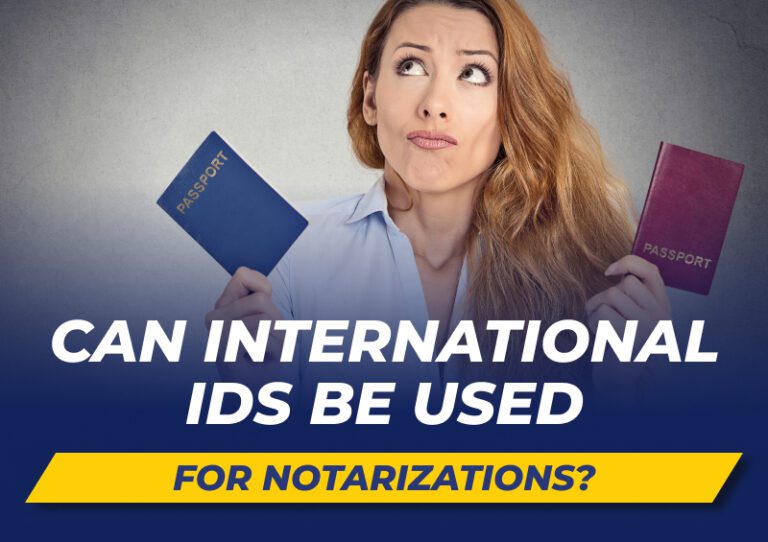A signer from a foreign country is seeking a notarization and presents a passport from their home country as their only form of identification. The first question to consider is whether this ID is acceptable.
To accept foreign IDs, they must meet the criteria set forth by the Notary laws in the state where the notarization is taking place. Here are some examples of state regulations regarding foreign IDs.
Foreign Passports
Foreign passports are the most commonly accepted form of foreign identification for notarization, but requirements vary among states.
One common requirement is that the passport be stamped by USCIS. Some states, such as Florida, Georgia, Nebraska, and Tennessee, allow Notaries to accept a properly stamped foreign passport.
Other states that accept foreign passports do not specify the need for a stamp. These include Iowa, Mississippi, Montana, North Dakota, Oregon, South Carolina, Utah, and West Virginia. Except for Mississippi, South Carolina, and Utah, these states also allow expired passports, as long as they are not more than three years past the date of expiration.
Certain states have more rigorous requirements for foreign passports. For instance, California and Tennessee require all foreign passports to include a serial or ID number, a photo, physical description, and signature of the holder, even if stamped by USCIS (California Notaries may accept a foreign passport without a USCIS stamp). Florida requires a foreign passport to contain a serial or identifying number and to be current or, if expired, issued within the past 5 years. Massachusetts requires passports to have a signature and photograph, while Oregon mandates that a foreign passport must be from a nation recognized by the United States on a federal level.
Using Foreign Passports for Notarizations in Arizona and Texas
In Arizona, a foreign passport can be accepted as a valid form of identification for documents related to conveying or financing real property. Similarly, in Texas, it can be used for a deed or other document pertaining to a residential real estate transaction. However, neither state permits foreign passports to be used for any other type of document.
Other Forms of International Identification
There are very few other foreign IDs that Notaries are permitted to accept under state laws.
California allows driver’s licenses issued by Canada and Mexico that have a serial number, photograph, physical description, and signature. Florida also permits these driver’s licenses, provided they have a serial number. In both states, the license need not be current as long as it was issued within the past five years.
In Arizona, for real estate conveyances and financing, Notaries can accept any other valid, unexpired ID that is acceptable to the U.S. Department of Homeland Security for establishing an individual’s legal presence in the United States and is accompanied by the necessary supporting documents as mandated by DHS. Notaries in the state can refer to the Arizona Notary Public Reference Manual for more information.
One type of ID that can be confusing is a consular ID issued by the consulate of a foreign country. Among these, the Matricula Consular Cards issued by Mexican consulates are the most prevalent. They appear to be very official and dependable, particularly the newer versions. However, only Notaries in Illinois and Nevada are explicitly authorized to accept them. The use of Matricula cards has sparked controversy due to concerns that they may be vulnerable to fraud. In 2017, California passed a state law allowing Notaries to accept foreign consular IDs as proof of identity if the ID is current or was issued within the past five years, contains a serial or identification number, and includes the signature, photograph, and description of the bearer. However, Mexican Matricula Consular Cards are not permissible under the California law because they lack a physical description of the bearer.
What are the Acceptable Forms of International Identification for Notarizations?
Notary laws of certain states do not explicitly mention foreign passports or international IDs, but instead provide a general list of requirements that any acceptable identification should meet. As a Notary in such states, it is crucial to consult your state’s Notary handbook or the commissioning agency’s website for guidance. For instance, Georgia’s Notary Handbook cites a foreign passport that has been stamped by the USCIS as an acceptable form of identification.
It is important to note that foreign IDs are sometimes written in a foreign language. Unless you are proficient in the language used in your client’s passport or the passport contains an English translation, you should not accept it as identification. This is because you will be unable to verify your client’s identity. It is never advisable to rely on a third party to translate information for you.
In situations where a signer has no acceptable identification, some states allow you to rely on one or more credible witnesses to identify the signer, regardless of their citizenship or immigration status. Additionally, for Notaries in Virginia and Delaware, a signer may present an alien registration card with a photograph.
Not all foreign IDs are acceptable for notarizations, and it is important to note that matricula consular cards issued by Mexican consulates are not accepted in most states. Notaries in Illinois and Nevada are specifically allowed to accept them. California has recently passed a law allowing foreign consular IDs as proof of identity provided they meet certain requirements, but Mexican matricula consular cards are not acceptable under this law due to the lack of physical description of the bearer.



